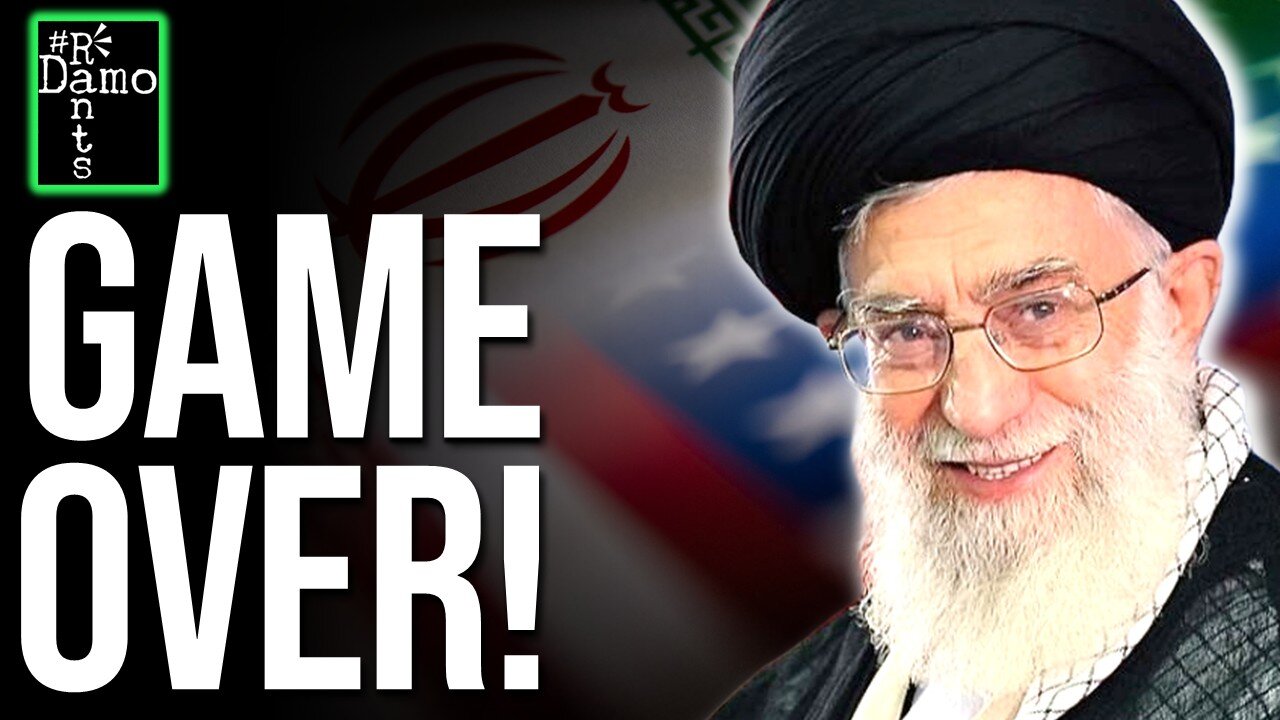Premium Only Content

Iran Just Told Trump He Can Shove His Sanctions In Their Most Brazen Way Yet!
Right, so Iran’s tankers are back on radar and the US Navy’s pretending not to see them. For five years those ships have run dark—names scrubbed, trackers off—because if America spotted them, it would seize them. Now they’ve lit the systems up again and kept right on sailing. No interception. No confiscation. No threat. Just silence. That’s what happens when the enforcer runs out of enforcement though isn’t it? That’s what happens when you’re no longer feared. The empire that once policed half the planet’s oil routes can’t even stop a sanctioned state from selling two million barrels a day to China. The data’s public, the tankers are now visible again. Iran no longer fears US sanctions at all it seems, so if this isn’t the most lowkey way they could tell Trump when he can stick them, I don’t know what is.
Right, so when those tankers lit up again, it wasn’t just a few blips on radar. It was a signal, sent to anyone still pretending Washington owned the sea lanes. For years the United States enforced its will through a combination of fear and reach. Fear that a cargo could be impounded anywhere, and reach to make that threat credible. What you’re seeing now is the world realising both have gone. The tankers didn’t sneak out; they sailed openly. That’s how you measure the death of deterrence isn’t it? Because what made the U.S. sanction machine work wasn’t the law itself, it was the aura around it. The sense that no one could escape it. Every Treasury list, every “advisory” about compliance, relied on that assumption. Even the big oil traders went along, not because they believed in the justice of it, but because they assumed the punishment would come. And for a while it did. Ships were seized, cargoes diverted, accounts frozen. The fear was self-reinforcing. Now the cycle’s broken.
The EIA data tells you what replaced it: adaptation. When one path closed, Iran built another. Barter deals with China and Russia. Non-dollar payment channels. Flag registries in states that no longer cared what Washington thought. Every sanction became a stress test, and every test made the system tougher. That’s why by 2025, the flows had not just returned—they’d surpassed pre-sanction levels.
You can’t run an empire on bluff and Trump is amongst many other things, a bluffer. Once the bluff’s called and nothing happens, the whole structure comes down. That’s what the tankers represent. A power that once seized oil at will now stands aside because confrontation costs more than compliance ever did.
Even within the United States, the contradictions are clear. The Navy’s global footprint reads like a map of overextension: deployments in the Caribbean under the guise of counter-narcotics, intercept missions in the Red Sea, deterrence patrols around Taiwan. They don’t hide the problem. They just don’t say what it means.
And what it means is that Washington’s enforcement power has been hollowed out by its own tempo. You can’t police the planet and still be credible in every part of it. Iran has simply proven that now. It tested the enforcement mechanism where the US can least afford to escalate—on energy routes the whole world depends on—and nothing came back. So the deterrent is broken, and everyone watching knows it. Iran has told Trump exactly where he can stick his sanctions.
The Stimson Center called Iran’s performance “remarkably resilient.” That’s diplomatic language for “we failed.” Every analyst who tracks the flow of oil through Hormuz knows what those numbers really show. This is an economy Washington swore it could strangle operating at full strength under sanction. The numbers have gone from compliance to mockery.
What’s changed isn’t just trade—it’s psychology. There was a time when states adjusted policy to avoid Treasury penalties. Now they adjust accounting to bypass them. Sanctions haven’t stopped the behaviour they targeted; they’ve normalised circumvention of them. Every Iranian shipment that reaches its buyer openly is another country learning that the threat is overstated.
The language around enforcement still pretends authority exists. You’ll hear phrases like “monitoring compliance,” “enforcing restrictions,” “maintaining freedom of navigation.” But look closely at the verbs—they’re all bureaucratic. There’s no act of interdiction left, just observation. The gap between the language of control and the reality of Trumpian impotence widens every month. The tankers aren’t hiding. The empire’s pretending not to see.
The Council on Foreign Relations admits it if you read carefully: these sanctions have no international mandate. They rely entirely on others choosing to comply. Once that voluntary obedience slips, the entire apparatus is just paperwork, it’s just mouthing off. The Treasury still sends out advisories, but without ships to back them up or allies willing to intercept, its just meaningless words.
And even allies are adjusting. Gulf monarchies that once enforced the American line in the Strait are hedging. Insurance brokers in Dubai are covering Iranian cargoes. Regional traders are using local clearing systems. They see what Washington doesn’t dare say: if you follow these restrictions too literally, you lose business. Iran’s success has turned noncompliance into the safer bet.
That’s why the switch to visible tracking is such a final act. It’s Iran saying: we’ve mapped your limits. You know it, we know it, and now the world gets to see it on a live feed. Every AIS ping is a reminder of the gap between US rhetoric and US reach. They said the sanctions would isolate Iran. Instead they’ve isolated the sanctions.
When maximum pressure started, it was supposed to show that economic warfare could replace real warfare. No need for invasions—just cut off the money. What we’re seeing now is the end of that illusion. Economic coercion only works when you can still control the markets. Once alternative buyers and currencies exist, the weapon turns inward. You spend resources enforcing a fiction.
Look at how the US Treasury’s routine has become detached from consequence. A new list of names, a new warning about compliance. No change in behaviour follows, but the lists keep coming. That’s not enforcement—that’s bureaucracy mistaking motion for action. And each time they repeat the gesture, the loss of authority just becomes more visible.
This is how empires end in practice. Not through defeat, but through ritual. Orders still get written, statements still made, but the world stops responding. Yet the institution carries on out of habit.
The Iranian case makes that visible in a way even Washington’s closest allies can’t ignore. Because it’s not happening in some remote corner. It’s happening on open shipping trackers that anyone can see. You don’t need leaked documents or secret cables; you just need to look at the global AIS map. Those dots moving east from Kharg Island to the South China Sea are the end of an era, drawn in real time.
It’s worth remembering why this model worked for so long though. Sanctions were never just about punishing enemies—they were about keeping everyone else obedient. The idea was simple: comply voluntarily or face the same fate. That’s why secondary sanctions were always the real weapon. But once major economies like China stopped pretending to care, the fear broke. The United States can sanction Chinese refiners all it likes, but it can’t sanction the entire Chinese market. The numbers are too big.
So the enforcer has to watch its own rules being ignored by the one economy it can’t afford to confront. The phrase “maximum pressure” now reads like a bad joke. You can’t pressure someone who doesn’t need your system. You can’t isolate a country that’s already found another network.
What’s collapsing here isn’t a specific policy—it’s a worldview. The belief that enforcement equals control, that punishment equals obedience. The data now show the opposite. The more the US punishes, the more alternatives grow. Sanctions don’t suppress defiance anymore; they manufacture it.
That’s why you won’t see a show of force in the Gulf. The United States knows confrontation would expose exactly how much capacity it’s lost. One damaged ship, one failed interception, and the illusion of naval supremacy would be gone. So it stays quiet, hoping no one notices that silence has become its only tool. But everyone does and not just because I’m here pointing it out either.
And because of that silence, the credibility gap widens every week. The smaller powers that once followed Washington’s lead now measure risk differently. If Iran can trade under sanction, why comply at all? The cost-benefit calculation that kept the order in place has flipped. Obedience costs more than resistance.
The sanctions architecture was once the crown jewel of American diplomacy—cheap, precise, and terrifyingly effective. Now it’s a legacy system the world’s simply outgrown. The Treasury keeps it running because it has no alternative. The Navy keeps sailing because it can’t admit irrelevance. The rhetoric keeps coming because it’s all they have left.
But the oil still flows. The markets have moved on. And Washington, once the guardian of global trade, now measures success by how long it can postpone admitting the loss.
This is the part no one inside the system will ever say out loud: the tankers turned their lights back on because they no longer needed permission. The United States can track every one of them. It can’t touch them. That’s the measure of how far its reach has shrunk.
Iran didn’t win through defiance alone though. It won through endurance. It just kept trading until the threat burned itself out. That’s not luck. That’s strategy. Because Tehran understood something Washington didn’t: coercion is only power when it works. When it fails, it’s exposure.
And now the exposure is total. Every statistic, every visible voyage, every unchallenged shipment is proof that the empire of enforcement is in its death throes.
One possible direction sanctions can go in aside from being ineffective though is in being petulant. Indonesia cancelled visas for Israeli athletes due to compete in the World Artistic Gymnastics Championships earlier this month and now the International Olympic Committee has chosen to suspend their Olympic Games bid for 2036 and is urging other sporting organisations to not stage events in the country. The Olympics stand with Israel apparently, well Indonesia is standing its ground too, sanctions again failing to make a difference except to make the perpetrators of them look like absolute fools. So get all the details of that story in this video recommendation here as your suggested next watch.
Please do also hit like, share and subscribe if you haven’t done so already so as to ensure you don’t miss out on all new daily content as well as spreading the word and helping to support the channel at the same time which is very much appreciated, holding power to account for ordinary working class people and I will hopefully catch you on the next vid. Cheers folks.
-
 LIVE
LIVE
Mally_Mouse
1 hour ago🌶️ 🥵Spicy BITE Saturday!! 🥵🌶️- Let's Play: Minecraft Christmas Adventure!!
8,079 watching -
 26:09
26:09
Exploring With Nug
10 hours ago13 Cold Cases in New Orleans What We Discovered Beneath the Surface!
25.2K4 -
 27:39
27:39
MYLUNCHBREAK CHANNEL PAGE
5 hours agoDestroying Time.
96.7K6 -
 LIVE
LIVE
SavageJayGatsby
1 hour ago🔥🌶️ Spicy Saturday – BITE Edition! 🌶️🔥
54 watching -
 2:14:31
2:14:31
Side Scrollers Podcast
6 hours agoSide Scrollers INVITE ONLY - Live From Dreamhack
132K7 -
 1:18:23
1:18:23
Simply Bitcoin
2 days ago $11.83 earnedThe Bitcoin Crucible w/ Alex Stanczyk and Lawrence Lepard
22K4 -
 1:25:03
1:25:03
Jeff Ahern
6 hours ago $16.99 earnedThe Saturday Show with Jeff Ahern
74.5K9 -
 1:31:56
1:31:56
Michael Franzese
21 hours agoWill NBA do anything about their Gambling Problems?
134K26 -
 57:26
57:26
X22 Report
10 hours agoMr & Mrs X - The Food Industry Is Trying To Pull A Fast One On RFK Jr (MAHA), This Will Fail - EP 14
108K68 -
 2:01:08
2:01:08
LFA TV
1 day agoTHE RUMBLE RUNDOWN LIVE @9AM EST
164K15